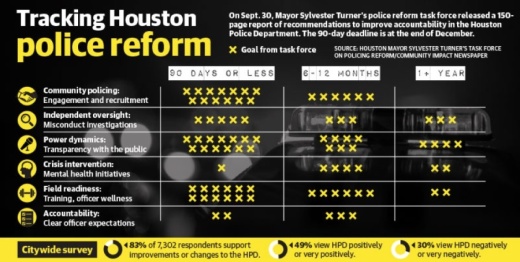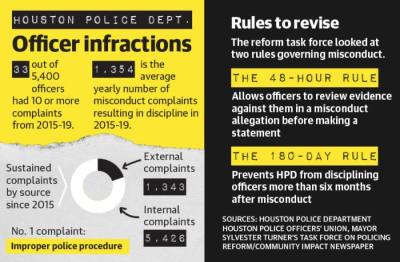“People are watching in a way that they haven’t before,” said Carla Brailey, the co-chair of Houston Mayor Sylvester Turner’s Task Force on Policing Reform. “Being a part of this committee, we knew the results could be a matter of life or death.”
In the seven months since Floyd’s death, the task force has proposed changes to focus on better accountability and discipline measures for Houston police. One relates to the contract between the Houston Police Officers’ Union and the city, and the other relates to Houston’s Independent Police Oversight Board, which serves as an independent check to the police department’s Internal Affairs Division, which investigates officer misconduct.
However, some stakeholders believe the contract and board are working as intended.
“[Activists] think that officers are just getting away with stuff all the time,” HPOU Executive Director Ray Hunt said. “It’s just not true.”
Contract provisions
By Dec. 31, the three-year labor contract between the union and Turner is set to be renewed.
Both the task force and the American Civil Liberties Union of Texas released reports with proposals to alter two key HPOU contract provisions. One is the 48-hour rule allowing officers to review evidence against them in a misconduct allegation before making a statement, and the other is the 180-day rule preventing the police department from disciplining officers involved in misconduct that occurred more than six months prior.
These are not unique to Houston, and state law allows any police union to adopt them. Some argue they give officers an advantage in misconduct allegations.
“Meaningful accountability and oversight of police means we need fair disciplinary processes in place that [don’t] give officers special treatment,” said Nick Hudson, a criminal justice policy analyst with the ACLU of Texas.
Kevin Lawrence, the executive director of statewide police union Texas Municipal Police Association, said the 48-hour rule is part of a balancing act. If officers are required to submit a statement following an allegation but civilians have the right to remain silent, the rule levels the playing field, he said.
In an Oct. 5 memo, HPOU Vice President Doug Griffith wrote even with the rules, officers could still be fired with the mayor’s approval.
“There are incidents where people are let go as they should be,” Hudson said. “But we need to look at the system as a whole.”
Although Turner received the union’s backing in both of his election bids, he said he is willing to consider any recommendation.
“We are certainly taking the recommendations of the task force very seriously, and I look forward to having those conversations,” Turner said.
Oversight board changes
In addition to suggested contract changes, the police reform task force has also suggested changes to the oversight board.
The main concerns raised related to the board are complaints are too difficult to file, misconduct investigations by the internal affairs division favor police, and too many members of the oversight board consistently approve internal affairs’ assessments regardless of other members’ dissent.
Activists, task force members and former oversight board members have all said the existing misconduct review process makes filing complaints against officers difficult and does little to factor in the number of complaints an officer receives over the course of their career.
HPD data shows between 2015-19, 20% of complaints that ended with sanctions came from the public. The rest were filed internally among HPD personnel. Allowing residents to submit complaints directly to HPD only via phone or a notarized form creates a barrier, the task force concluded.
This lack of accessibility prompted local advocacy group Houston Justice to begin an effort to form its own online complaint system.
Karla Brown, an organizer with the group, said the issue was highlighted by a botched no-knock raid in January 2019 that resulted in the deaths of an East End couple: Rhogena Nicholas and Dennis Tuttle. The aftermath of the raid saw several Houston police officers indicted.
“What we’re seeing is that it takes somebody to die to bring attention to something that an officer had been doing for years,” she said.
The loss of community trust in misconduct reviews can have long-lasting effects, according to a November Kinder Institute of Urban Research report. It found Houston’s board to be the least effective oversight system among those in major Texas cities.
By the time a complaint makes it to the board, the HPD investigation of it favors police, the task force and some board members said. In August, nine-year board member Kristin Anderson resigned, referring to the issue.
“[The oversight board] operates inside a closed system without the ability to investigate, conduct its own interviews or do anything else but follow the narrative offered to them,” she wrote.
Hunt, however, said he believes the process keeps out political influence.
“This is our careers on the line, so we want experienced investigators doing this and not some board created by a bunch of activists,” he said.
Board member Shelley Kennedy said she has been troubled by the disciplinary process because some board members and HPD staff that serve on HPD’s Administrative Disciplinary Committee consistently vote in favor of Iax disciplinary measures regardless of the severity or frequency of complaints against an officer, she said.
“No matter how much we scream and holler, we can still be outvoted,” Kennedy said.
This conflict came to head in September when HPD Chief Art Acevedo fired four police officers after they shot Houston resident Nicolas Chavez 21 times while he was experiencing a mental health crisis and pulled away an officer’s stun gun.
“It is distressing to the task force that the civilians put in place to hold officers accountable would defend these officers’ actions when even the chief of police himself said that he ‘cannot defend [the officers’]’ actions,’’ the task force report reads.
What is next?
Potential reform efforts—both for the contract and board changes—are around the corner.
The HPOU contract will automatically renew as is Dec. 31 with the 48-hour and 180-day rules in effect. It can be renegotiated after Dec. 31.
If the union contract remains largely untouched, disciplinary measures could still face scrutiny when the Texas Legislature reconvenes in January.
The ACLU and mayor’s task force reports also call for changes to the Texas Local Government Code allowing union contracts to include the 48-hour and 180-day rules, proposals HPOU leadership indicated they will lobby against.
“We are preparing for the upcoming battle here and in Austin beginning in January,” Griffith wrote.
As for the oversight board, the task force report ultimately calls for a “hybrid” model of oversight borrowing from other cities’ accountability systems. It proposes forming an investigative unit paid by the city to serve alongside the board.
Meanwhile, Brown said Houston Justice will continue working on its own database to track complaints.
“It’s kind of like you’re asking the city to tell on themselves,” she said. “They tend to skew things in a more positive way.”






